Nursing Care of Older People Essay: UTS Nursing (92437), Sem 2
VerifiedAdded on 2022/09/28
|12
|3500
|22
Essay
AI Summary
This essay analyzes the nursing care of older people, particularly those with dementia and arthritis receiving home care. It begins with a person-centered assessment, emphasizing the importance of involving patients and their families in decision-making. The essay reflects on a discussion with a 75-year-old individual, highlighting both positive aspects (family interaction) and negative challenges (dependency, lack of autonomy). A critical review of existing literature supports the need for caregiver education, patient involvement, and positive attitudes to enhance care. The discussion section recommends multidisciplinary teams, evidence-based practices, and the importance of communication and emergency preparedness in home care. The conclusion reinforces the significance of person-centered care principles and the need for comprehensive support for older patients, as referenced in the provided literature.
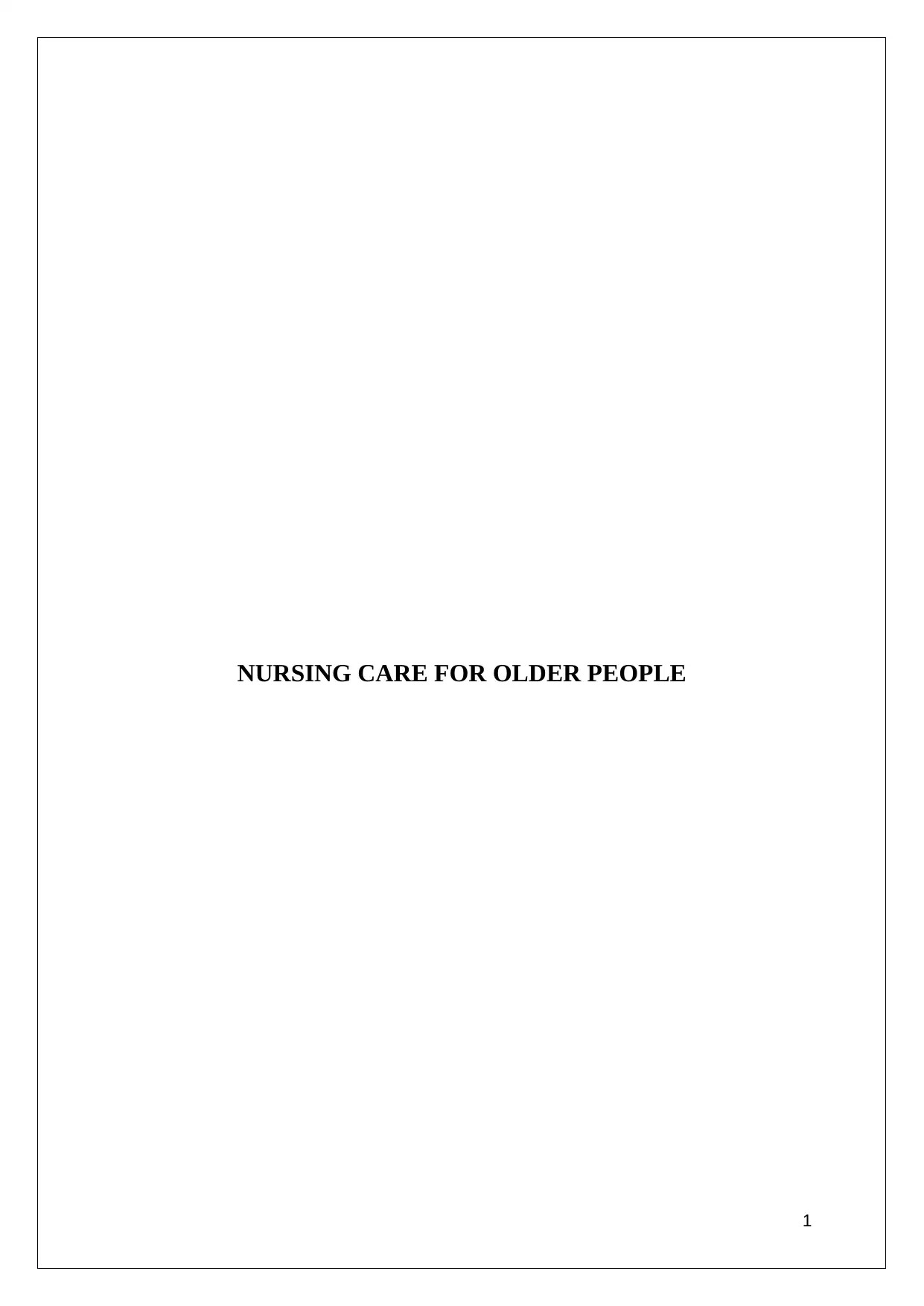
NURSING CARE FOR OLDER PEOPLE
1
1
Paraphrase This Document
Need a fresh take? Get an instant paraphrase of this document with our AI Paraphraser
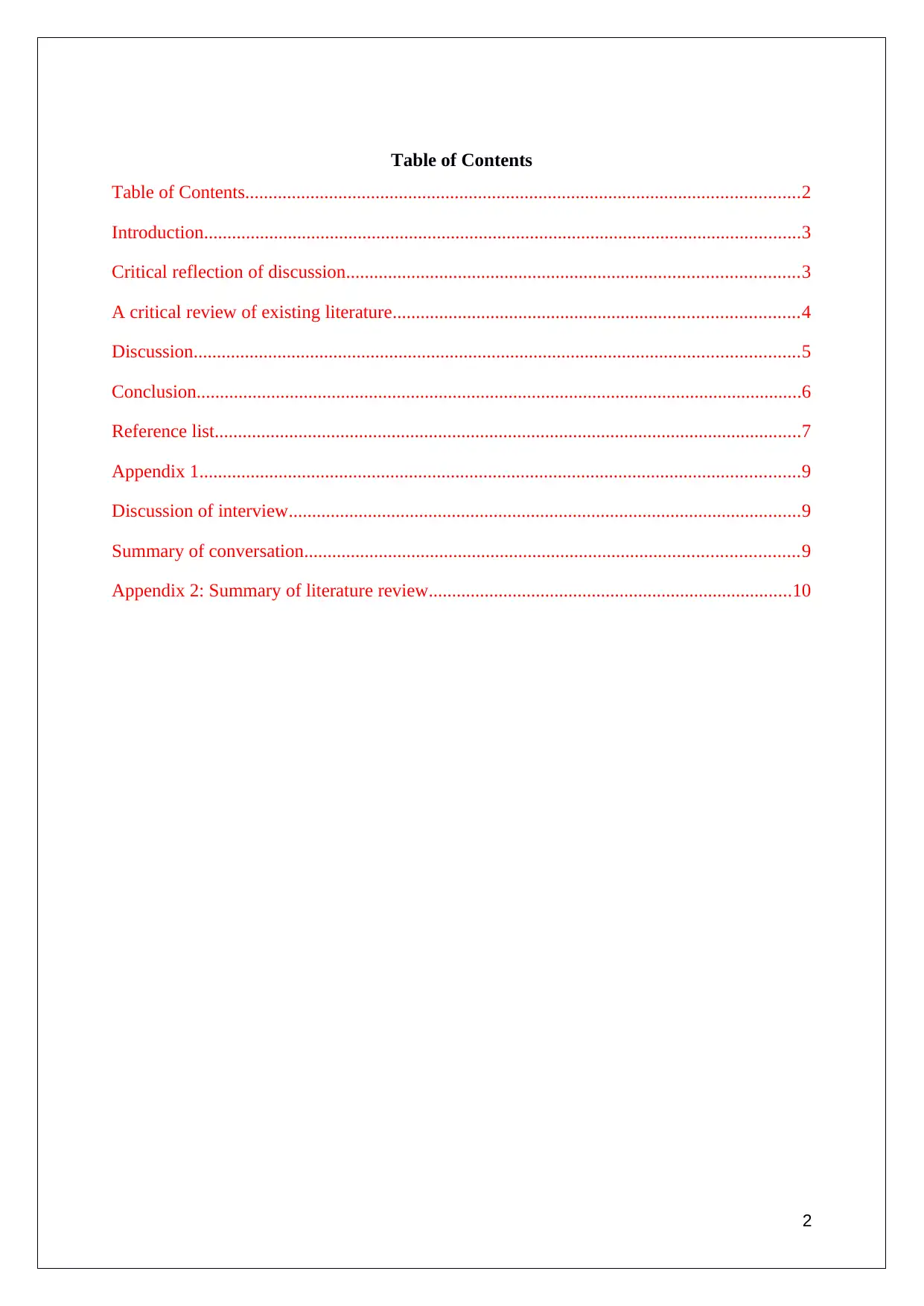
Table of Contents
Table of Contents.......................................................................................................................2
Introduction................................................................................................................................3
Critical reflection of discussion.................................................................................................3
A critical review of existing literature.......................................................................................4
Discussion..................................................................................................................................5
Conclusion..................................................................................................................................6
Reference list..............................................................................................................................7
Appendix 1.................................................................................................................................9
Discussion of interview..............................................................................................................9
Summary of conversation..........................................................................................................9
Appendix 2: Summary of literature review..............................................................................10
2
Table of Contents.......................................................................................................................2
Introduction................................................................................................................................3
Critical reflection of discussion.................................................................................................3
A critical review of existing literature.......................................................................................4
Discussion..................................................................................................................................5
Conclusion..................................................................................................................................6
Reference list..............................................................................................................................7
Appendix 1.................................................................................................................................9
Discussion of interview..............................................................................................................9
Summary of conversation..........................................................................................................9
Appendix 2: Summary of literature review..............................................................................10
2
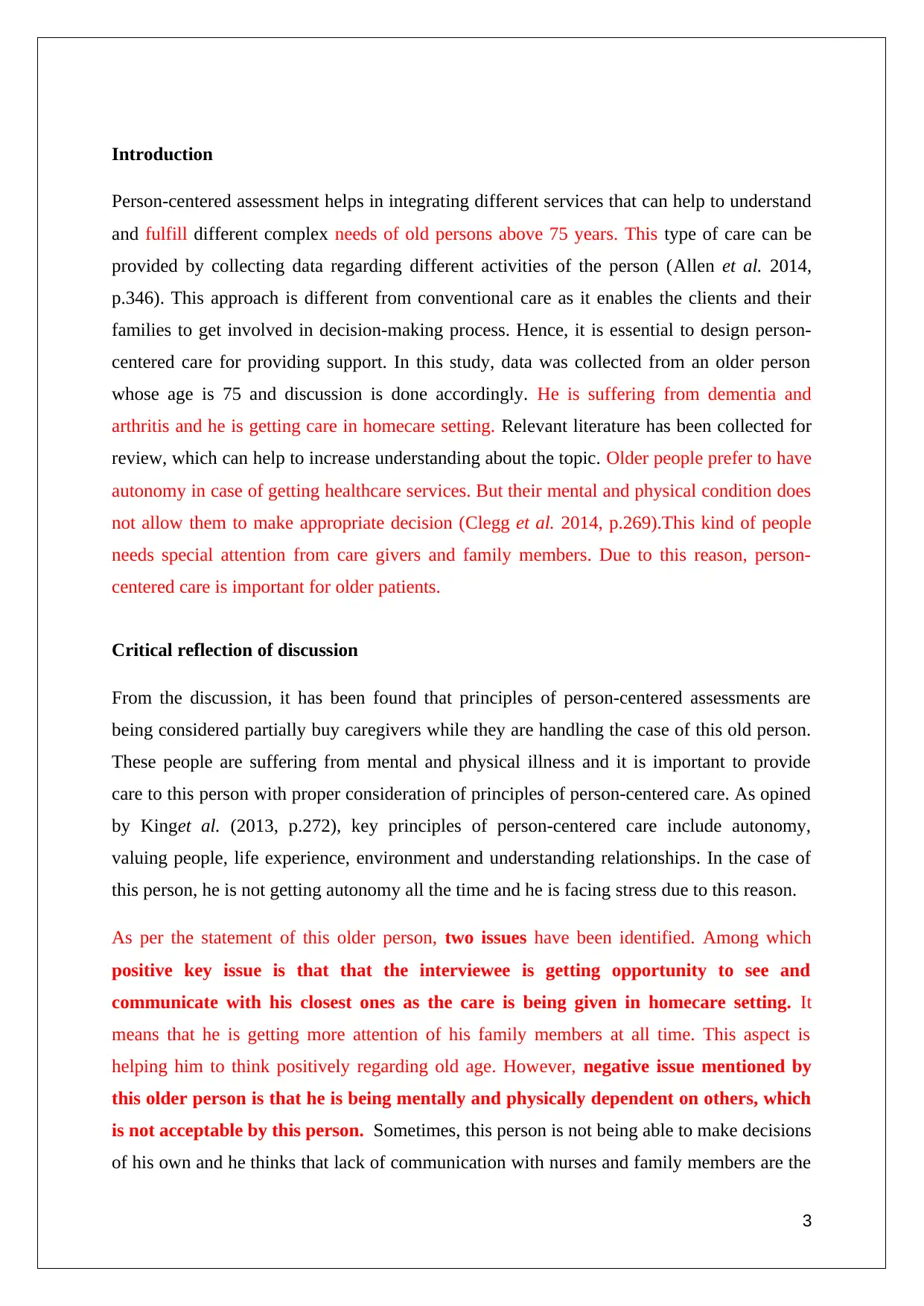
Introduction
Person-centered assessment helps in integrating different services that can help to understand
and fulfill different complex needs of old persons above 75 years. This type of care can be
provided by collecting data regarding different activities of the person (Allen et al. 2014,
p.346). This approach is different from conventional care as it enables the clients and their
families to get involved in decision-making process. Hence, it is essential to design person-
centered care for providing support. In this study, data was collected from an older person
whose age is 75 and discussion is done accordingly. He is suffering from dementia and
arthritis and he is getting care in homecare setting. Relevant literature has been collected for
review, which can help to increase understanding about the topic. Older people prefer to have
autonomy in case of getting healthcare services. But their mental and physical condition does
not allow them to make appropriate decision (Clegg et al. 2014, p.269).This kind of people
needs special attention from care givers and family members. Due to this reason, person-
centered care is important for older patients.
Critical reflection of discussion
From the discussion, it has been found that principles of person-centered assessments are
being considered partially buy caregivers while they are handling the case of this old person.
These people are suffering from mental and physical illness and it is important to provide
care to this person with proper consideration of principles of person-centered care. As opined
by Kinget al. (2013, p.272), key principles of person-centered care include autonomy,
valuing people, life experience, environment and understanding relationships. In the case of
this person, he is not getting autonomy all the time and he is facing stress due to this reason.
As per the statement of this older person, two issues have been identified. Among which
positive key issue is that that the interviewee is getting opportunity to see and
communicate with his closest ones as the care is being given in homecare setting. It
means that he is getting more attention of his family members at all time. This aspect is
helping him to think positively regarding old age. However, negative issue mentioned by
this older person is that he is being mentally and physically dependent on others, which
is not acceptable by this person. Sometimes, this person is not being able to make decisions
of his own and he thinks that lack of communication with nurses and family members are the
3
Person-centered assessment helps in integrating different services that can help to understand
and fulfill different complex needs of old persons above 75 years. This type of care can be
provided by collecting data regarding different activities of the person (Allen et al. 2014,
p.346). This approach is different from conventional care as it enables the clients and their
families to get involved in decision-making process. Hence, it is essential to design person-
centered care for providing support. In this study, data was collected from an older person
whose age is 75 and discussion is done accordingly. He is suffering from dementia and
arthritis and he is getting care in homecare setting. Relevant literature has been collected for
review, which can help to increase understanding about the topic. Older people prefer to have
autonomy in case of getting healthcare services. But their mental and physical condition does
not allow them to make appropriate decision (Clegg et al. 2014, p.269).This kind of people
needs special attention from care givers and family members. Due to this reason, person-
centered care is important for older patients.
Critical reflection of discussion
From the discussion, it has been found that principles of person-centered assessments are
being considered partially buy caregivers while they are handling the case of this old person.
These people are suffering from mental and physical illness and it is important to provide
care to this person with proper consideration of principles of person-centered care. As opined
by Kinget al. (2013, p.272), key principles of person-centered care include autonomy,
valuing people, life experience, environment and understanding relationships. In the case of
this person, he is not getting autonomy all the time and he is facing stress due to this reason.
As per the statement of this older person, two issues have been identified. Among which
positive key issue is that that the interviewee is getting opportunity to see and
communicate with his closest ones as the care is being given in homecare setting. It
means that he is getting more attention of his family members at all time. This aspect is
helping him to think positively regarding old age. However, negative issue mentioned by
this older person is that he is being mentally and physically dependent on others, which
is not acceptable by this person. Sometimes, this person is not being able to make decisions
of his own and he thinks that lack of communication with nurses and family members are the
3
⊘ This is a preview!⊘
Do you want full access?
Subscribe today to unlock all pages.

Trusted by 1+ million students worldwide
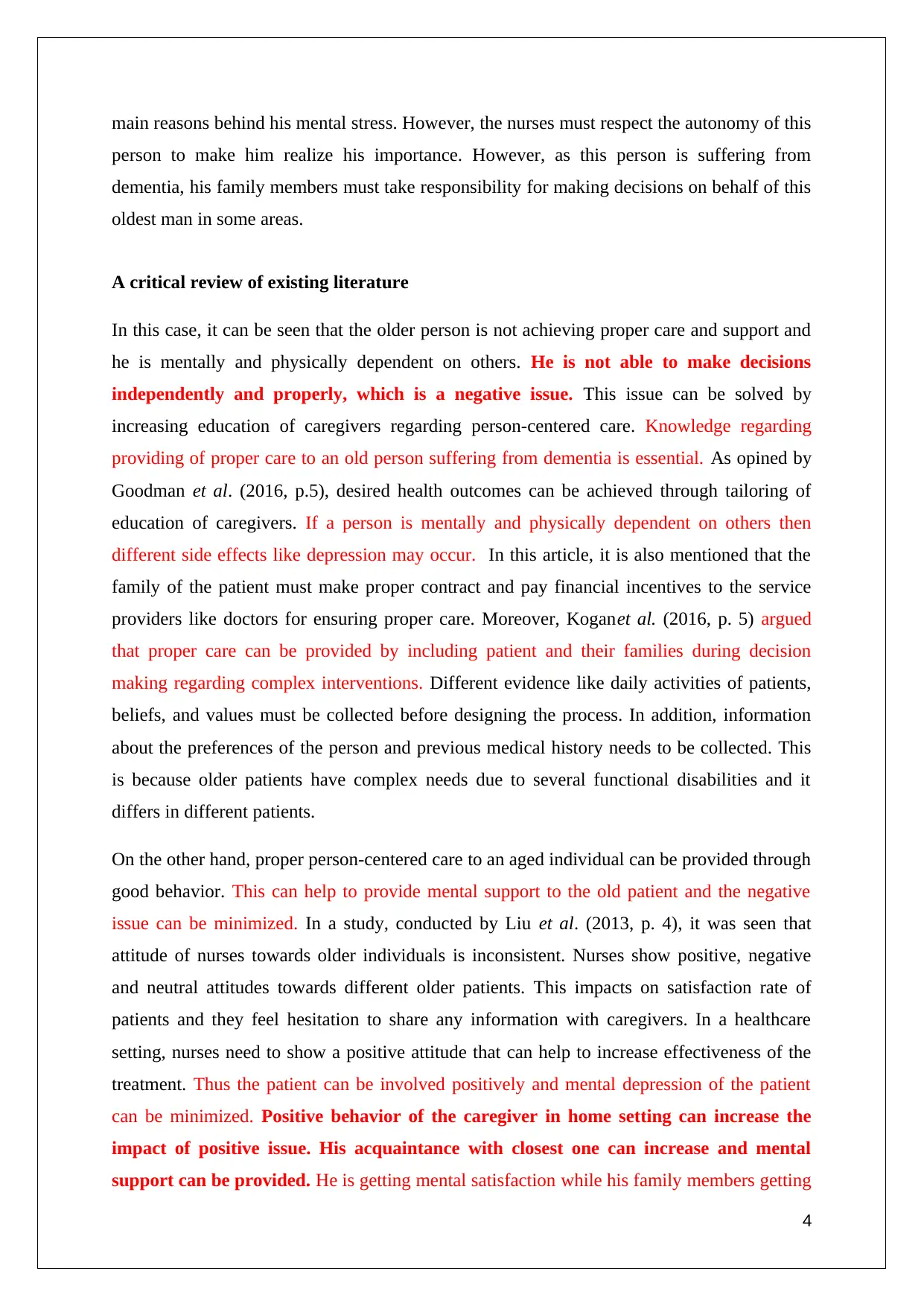
main reasons behind his mental stress. However, the nurses must respect the autonomy of this
person to make him realize his importance. However, as this person is suffering from
dementia, his family members must take responsibility for making decisions on behalf of this
oldest man in some areas.
A critical review of existing literature
In this case, it can be seen that the older person is not achieving proper care and support and
he is mentally and physically dependent on others. He is not able to make decisions
independently and properly, which is a negative issue. This issue can be solved by
increasing education of caregivers regarding person-centered care. Knowledge regarding
providing of proper care to an old person suffering from dementia is essential. As opined by
Goodman et al. (2016, p.5), desired health outcomes can be achieved through tailoring of
education of caregivers. If a person is mentally and physically dependent on others then
different side effects like depression may occur. In this article, it is also mentioned that the
family of the patient must make proper contract and pay financial incentives to the service
providers like doctors for ensuring proper care. Moreover, Koganet al. (2016, p. 5) argued
that proper care can be provided by including patient and their families during decision
making regarding complex interventions. Different evidence like daily activities of patients,
beliefs, and values must be collected before designing the process. In addition, information
about the preferences of the person and previous medical history needs to be collected. This
is because older patients have complex needs due to several functional disabilities and it
differs in different patients.
On the other hand, proper person-centered care to an aged individual can be provided through
good behavior. This can help to provide mental support to the old patient and the negative
issue can be minimized. In a study, conducted by Liu et al. (2013, p. 4), it was seen that
attitude of nurses towards older individuals is inconsistent. Nurses show positive, negative
and neutral attitudes towards different older patients. This impacts on satisfaction rate of
patients and they feel hesitation to share any information with caregivers. In a healthcare
setting, nurses need to show a positive attitude that can help to increase effectiveness of the
treatment. Thus the patient can be involved positively and mental depression of the patient
can be minimized. Positive behavior of the caregiver in home setting can increase the
impact of positive issue. His acquaintance with closest one can increase and mental
support can be provided. He is getting mental satisfaction while his family members getting
4
person to make him realize his importance. However, as this person is suffering from
dementia, his family members must take responsibility for making decisions on behalf of this
oldest man in some areas.
A critical review of existing literature
In this case, it can be seen that the older person is not achieving proper care and support and
he is mentally and physically dependent on others. He is not able to make decisions
independently and properly, which is a negative issue. This issue can be solved by
increasing education of caregivers regarding person-centered care. Knowledge regarding
providing of proper care to an old person suffering from dementia is essential. As opined by
Goodman et al. (2016, p.5), desired health outcomes can be achieved through tailoring of
education of caregivers. If a person is mentally and physically dependent on others then
different side effects like depression may occur. In this article, it is also mentioned that the
family of the patient must make proper contract and pay financial incentives to the service
providers like doctors for ensuring proper care. Moreover, Koganet al. (2016, p. 5) argued
that proper care can be provided by including patient and their families during decision
making regarding complex interventions. Different evidence like daily activities of patients,
beliefs, and values must be collected before designing the process. In addition, information
about the preferences of the person and previous medical history needs to be collected. This
is because older patients have complex needs due to several functional disabilities and it
differs in different patients.
On the other hand, proper person-centered care to an aged individual can be provided through
good behavior. This can help to provide mental support to the old patient and the negative
issue can be minimized. In a study, conducted by Liu et al. (2013, p. 4), it was seen that
attitude of nurses towards older individuals is inconsistent. Nurses show positive, negative
and neutral attitudes towards different older patients. This impacts on satisfaction rate of
patients and they feel hesitation to share any information with caregivers. In a healthcare
setting, nurses need to show a positive attitude that can help to increase effectiveness of the
treatment. Thus the patient can be involved positively and mental depression of the patient
can be minimized. Positive behavior of the caregiver in home setting can increase the
impact of positive issue. His acquaintance with closest one can increase and mental
support can be provided. He is getting mental satisfaction while his family members getting
4
Paraphrase This Document
Need a fresh take? Get an instant paraphrase of this document with our AI Paraphraser
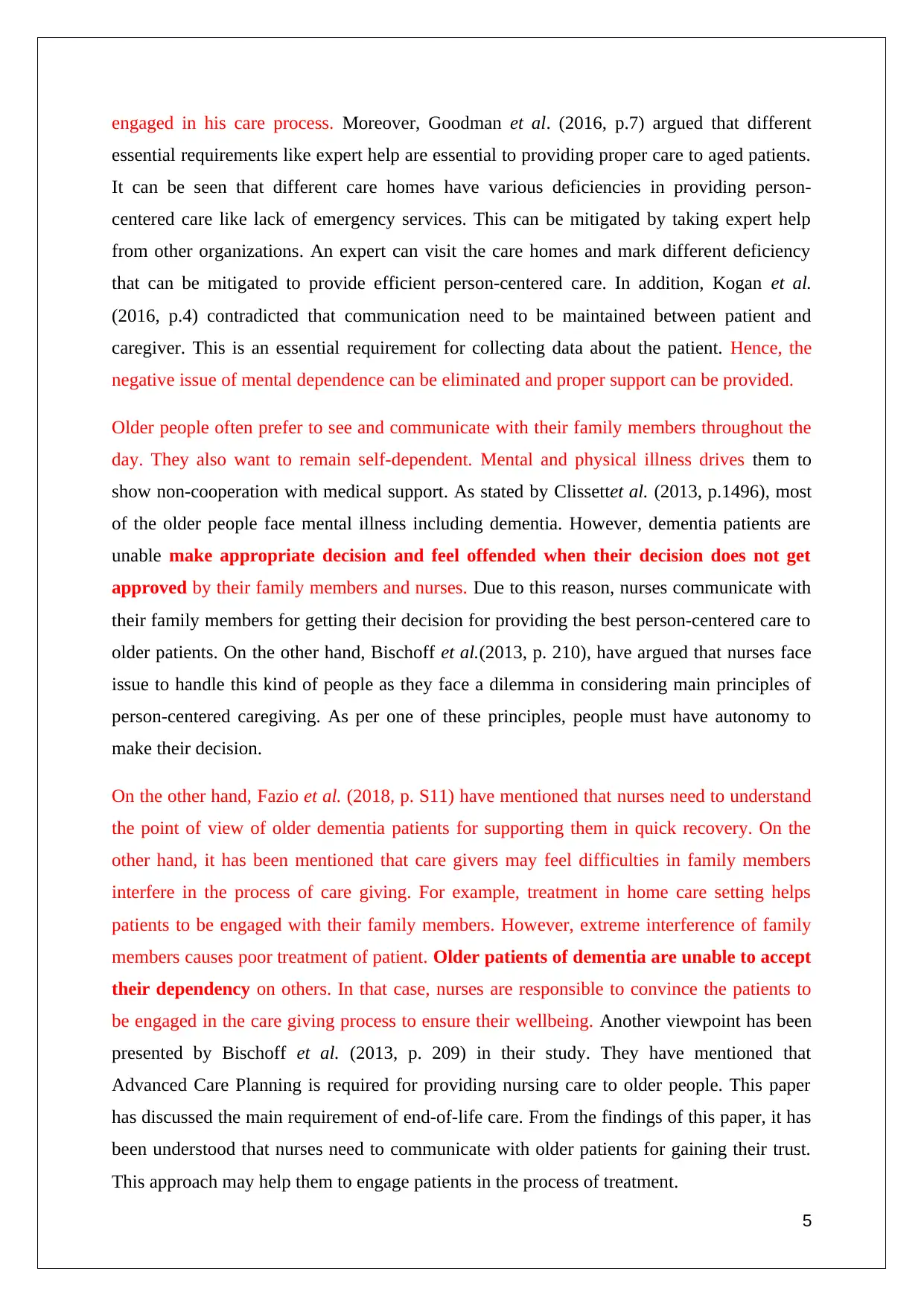
engaged in his care process. Moreover, Goodman et al. (2016, p.7) argued that different
essential requirements like expert help are essential to providing proper care to aged patients.
It can be seen that different care homes have various deficiencies in providing person-
centered care like lack of emergency services. This can be mitigated by taking expert help
from other organizations. An expert can visit the care homes and mark different deficiency
that can be mitigated to provide efficient person-centered care. In addition, Kogan et al.
(2016, p.4) contradicted that communication need to be maintained between patient and
caregiver. This is an essential requirement for collecting data about the patient. Hence, the
negative issue of mental dependence can be eliminated and proper support can be provided.
Older people often prefer to see and communicate with their family members throughout the
day. They also want to remain self-dependent. Mental and physical illness drives them to
show non-cooperation with medical support. As stated by Clissettet al. (2013, p.1496), most
of the older people face mental illness including dementia. However, dementia patients are
unable make appropriate decision and feel offended when their decision does not get
approved by their family members and nurses. Due to this reason, nurses communicate with
their family members for getting their decision for providing the best person-centered care to
older patients. On the other hand, Bischoff et al.(2013, p. 210), have argued that nurses face
issue to handle this kind of people as they face a dilemma in considering main principles of
person-centered caregiving. As per one of these principles, people must have autonomy to
make their decision.
On the other hand, Fazio et al. (2018, p. S11) have mentioned that nurses need to understand
the point of view of older dementia patients for supporting them in quick recovery. On the
other hand, it has been mentioned that care givers may feel difficulties in family members
interfere in the process of care giving. For example, treatment in home care setting helps
patients to be engaged with their family members. However, extreme interference of family
members causes poor treatment of patient. Older patients of dementia are unable to accept
their dependency on others. In that case, nurses are responsible to convince the patients to
be engaged in the care giving process to ensure their wellbeing. Another viewpoint has been
presented by Bischoff et al. (2013, p. 209) in their study. They have mentioned that
Advanced Care Planning is required for providing nursing care to older people. This paper
has discussed the main requirement of end-of-life care. From the findings of this paper, it has
been understood that nurses need to communicate with older patients for gaining their trust.
This approach may help them to engage patients in the process of treatment.
5
essential requirements like expert help are essential to providing proper care to aged patients.
It can be seen that different care homes have various deficiencies in providing person-
centered care like lack of emergency services. This can be mitigated by taking expert help
from other organizations. An expert can visit the care homes and mark different deficiency
that can be mitigated to provide efficient person-centered care. In addition, Kogan et al.
(2016, p.4) contradicted that communication need to be maintained between patient and
caregiver. This is an essential requirement for collecting data about the patient. Hence, the
negative issue of mental dependence can be eliminated and proper support can be provided.
Older people often prefer to see and communicate with their family members throughout the
day. They also want to remain self-dependent. Mental and physical illness drives them to
show non-cooperation with medical support. As stated by Clissettet al. (2013, p.1496), most
of the older people face mental illness including dementia. However, dementia patients are
unable make appropriate decision and feel offended when their decision does not get
approved by their family members and nurses. Due to this reason, nurses communicate with
their family members for getting their decision for providing the best person-centered care to
older patients. On the other hand, Bischoff et al.(2013, p. 210), have argued that nurses face
issue to handle this kind of people as they face a dilemma in considering main principles of
person-centered caregiving. As per one of these principles, people must have autonomy to
make their decision.
On the other hand, Fazio et al. (2018, p. S11) have mentioned that nurses need to understand
the point of view of older dementia patients for supporting them in quick recovery. On the
other hand, it has been mentioned that care givers may feel difficulties in family members
interfere in the process of care giving. For example, treatment in home care setting helps
patients to be engaged with their family members. However, extreme interference of family
members causes poor treatment of patient. Older patients of dementia are unable to accept
their dependency on others. In that case, nurses are responsible to convince the patients to
be engaged in the care giving process to ensure their wellbeing. Another viewpoint has been
presented by Bischoff et al. (2013, p. 209) in their study. They have mentioned that
Advanced Care Planning is required for providing nursing care to older people. This paper
has discussed the main requirement of end-of-life care. From the findings of this paper, it has
been understood that nurses need to communicate with older patients for gaining their trust.
This approach may help them to engage patients in the process of treatment.
5
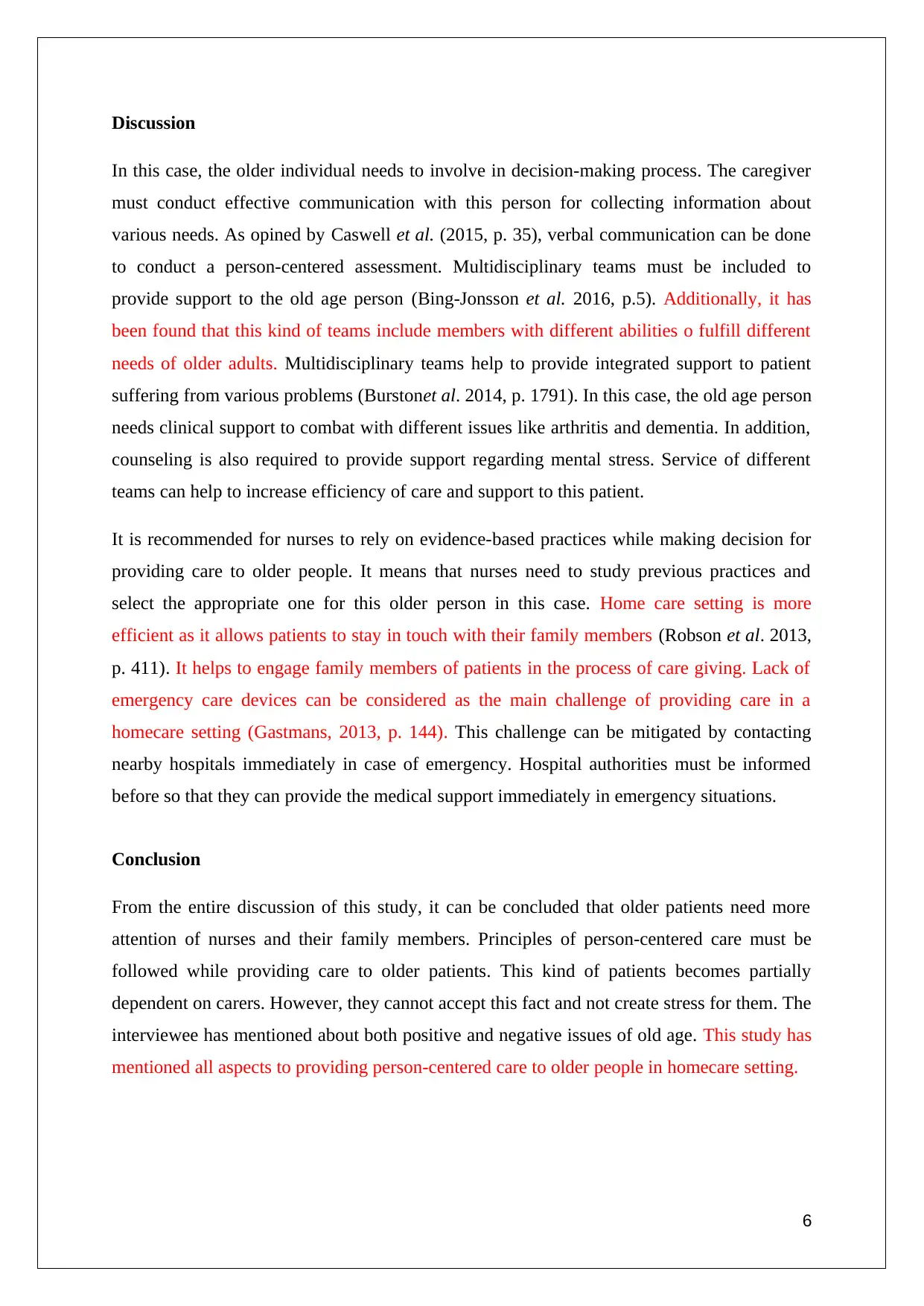
Discussion
In this case, the older individual needs to involve in decision-making process. The caregiver
must conduct effective communication with this person for collecting information about
various needs. As opined by Caswell et al. (2015, p. 35), verbal communication can be done
to conduct a person-centered assessment. Multidisciplinary teams must be included to
provide support to the old age person (Bing-Jonsson et al. 2016, p.5). Additionally, it has
been found that this kind of teams include members with different abilities o fulfill different
needs of older adults. Multidisciplinary teams help to provide integrated support to patient
suffering from various problems (Burstonet al. 2014, p. 1791). In this case, the old age person
needs clinical support to combat with different issues like arthritis and dementia. In addition,
counseling is also required to provide support regarding mental stress. Service of different
teams can help to increase efficiency of care and support to this patient.
It is recommended for nurses to rely on evidence-based practices while making decision for
providing care to older people. It means that nurses need to study previous practices and
select the appropriate one for this older person in this case. Home care setting is more
efficient as it allows patients to stay in touch with their family members (Robson et al. 2013,
p. 411). It helps to engage family members of patients in the process of care giving. Lack of
emergency care devices can be considered as the main challenge of providing care in a
homecare setting (Gastmans, 2013, p. 144). This challenge can be mitigated by contacting
nearby hospitals immediately in case of emergency. Hospital authorities must be informed
before so that they can provide the medical support immediately in emergency situations.
Conclusion
From the entire discussion of this study, it can be concluded that older patients need more
attention of nurses and their family members. Principles of person-centered care must be
followed while providing care to older patients. This kind of patients becomes partially
dependent on carers. However, they cannot accept this fact and not create stress for them. The
interviewee has mentioned about both positive and negative issues of old age. This study has
mentioned all aspects to providing person-centered care to older people in homecare setting.
6
In this case, the older individual needs to involve in decision-making process. The caregiver
must conduct effective communication with this person for collecting information about
various needs. As opined by Caswell et al. (2015, p. 35), verbal communication can be done
to conduct a person-centered assessment. Multidisciplinary teams must be included to
provide support to the old age person (Bing-Jonsson et al. 2016, p.5). Additionally, it has
been found that this kind of teams include members with different abilities o fulfill different
needs of older adults. Multidisciplinary teams help to provide integrated support to patient
suffering from various problems (Burstonet al. 2014, p. 1791). In this case, the old age person
needs clinical support to combat with different issues like arthritis and dementia. In addition,
counseling is also required to provide support regarding mental stress. Service of different
teams can help to increase efficiency of care and support to this patient.
It is recommended for nurses to rely on evidence-based practices while making decision for
providing care to older people. It means that nurses need to study previous practices and
select the appropriate one for this older person in this case. Home care setting is more
efficient as it allows patients to stay in touch with their family members (Robson et al. 2013,
p. 411). It helps to engage family members of patients in the process of care giving. Lack of
emergency care devices can be considered as the main challenge of providing care in a
homecare setting (Gastmans, 2013, p. 144). This challenge can be mitigated by contacting
nearby hospitals immediately in case of emergency. Hospital authorities must be informed
before so that they can provide the medical support immediately in emergency situations.
Conclusion
From the entire discussion of this study, it can be concluded that older patients need more
attention of nurses and their family members. Principles of person-centered care must be
followed while providing care to older patients. This kind of patients becomes partially
dependent on carers. However, they cannot accept this fact and not create stress for them. The
interviewee has mentioned about both positive and negative issues of old age. This study has
mentioned all aspects to providing person-centered care to older people in homecare setting.
6
⊘ This is a preview!⊘
Do you want full access?
Subscribe today to unlock all pages.

Trusted by 1+ million students worldwide
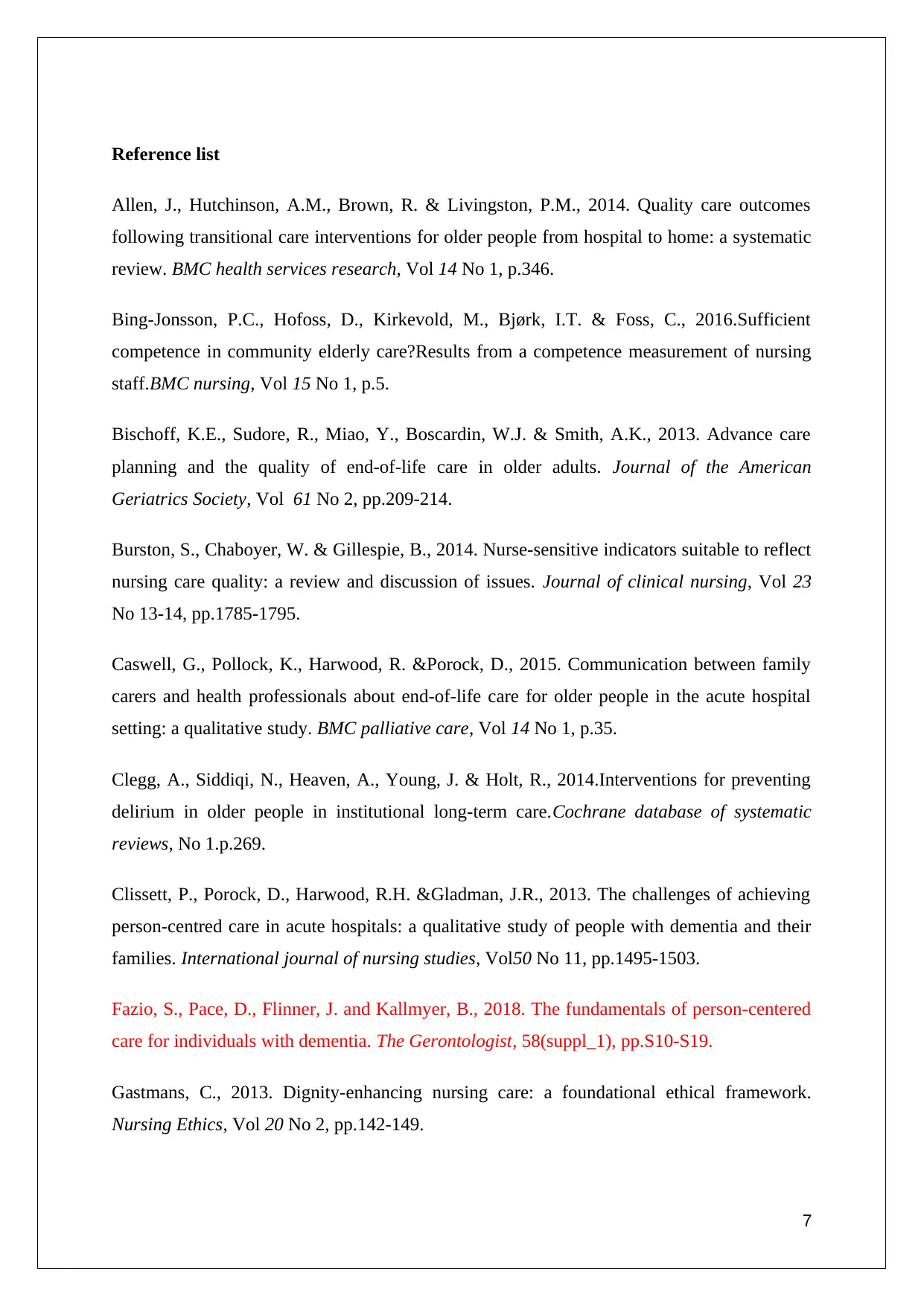
Reference list
Allen, J., Hutchinson, A.M., Brown, R. & Livingston, P.M., 2014. Quality care outcomes
following transitional care interventions for older people from hospital to home: a systematic
review. BMC health services research, Vol 14 No 1, p.346.
Bing-Jonsson, P.C., Hofoss, D., Kirkevold, M., Bjørk, I.T. & Foss, C., 2016.Sufficient
competence in community elderly care?Results from a competence measurement of nursing
staff.BMC nursing, Vol 15 No 1, p.5.
Bischoff, K.E., Sudore, R., Miao, Y., Boscardin, W.J. & Smith, A.K., 2013. Advance care
planning and the quality of end‐of‐life care in older adults. Journal of the American
Geriatrics Society, Vol 61 No 2, pp.209-214.
Burston, S., Chaboyer, W. & Gillespie, B., 2014. Nurse‐sensitive indicators suitable to reflect
nursing care quality: a review and discussion of issues. Journal of clinical nursing, Vol 23
No 13-14, pp.1785-1795.
Caswell, G., Pollock, K., Harwood, R. &Porock, D., 2015. Communication between family
carers and health professionals about end-of-life care for older people in the acute hospital
setting: a qualitative study. BMC palliative care, Vol 14 No 1, p.35.
Clegg, A., Siddiqi, N., Heaven, A., Young, J. & Holt, R., 2014.Interventions for preventing
delirium in older people in institutional long‐term care.Cochrane database of systematic
reviews, No 1.p.269.
Clissett, P., Porock, D., Harwood, R.H. &Gladman, J.R., 2013. The challenges of achieving
person-centred care in acute hospitals: a qualitative study of people with dementia and their
families. International journal of nursing studies, Vol50 No 11, pp.1495-1503.
Fazio, S., Pace, D., Flinner, J. and Kallmyer, B., 2018. The fundamentals of person-centered
care for individuals with dementia. The Gerontologist, 58(suppl_1), pp.S10-S19.
Gastmans, C., 2013. Dignity-enhancing nursing care: a foundational ethical framework.
Nursing Ethics, Vol 20 No 2, pp.142-149.
7
Allen, J., Hutchinson, A.M., Brown, R. & Livingston, P.M., 2014. Quality care outcomes
following transitional care interventions for older people from hospital to home: a systematic
review. BMC health services research, Vol 14 No 1, p.346.
Bing-Jonsson, P.C., Hofoss, D., Kirkevold, M., Bjørk, I.T. & Foss, C., 2016.Sufficient
competence in community elderly care?Results from a competence measurement of nursing
staff.BMC nursing, Vol 15 No 1, p.5.
Bischoff, K.E., Sudore, R., Miao, Y., Boscardin, W.J. & Smith, A.K., 2013. Advance care
planning and the quality of end‐of‐life care in older adults. Journal of the American
Geriatrics Society, Vol 61 No 2, pp.209-214.
Burston, S., Chaboyer, W. & Gillespie, B., 2014. Nurse‐sensitive indicators suitable to reflect
nursing care quality: a review and discussion of issues. Journal of clinical nursing, Vol 23
No 13-14, pp.1785-1795.
Caswell, G., Pollock, K., Harwood, R. &Porock, D., 2015. Communication between family
carers and health professionals about end-of-life care for older people in the acute hospital
setting: a qualitative study. BMC palliative care, Vol 14 No 1, p.35.
Clegg, A., Siddiqi, N., Heaven, A., Young, J. & Holt, R., 2014.Interventions for preventing
delirium in older people in institutional long‐term care.Cochrane database of systematic
reviews, No 1.p.269.
Clissett, P., Porock, D., Harwood, R.H. &Gladman, J.R., 2013. The challenges of achieving
person-centred care in acute hospitals: a qualitative study of people with dementia and their
families. International journal of nursing studies, Vol50 No 11, pp.1495-1503.
Fazio, S., Pace, D., Flinner, J. and Kallmyer, B., 2018. The fundamentals of person-centered
care for individuals with dementia. The Gerontologist, 58(suppl_1), pp.S10-S19.
Gastmans, C., 2013. Dignity-enhancing nursing care: a foundational ethical framework.
Nursing Ethics, Vol 20 No 2, pp.142-149.
7
Paraphrase This Document
Need a fresh take? Get an instant paraphrase of this document with our AI Paraphraser
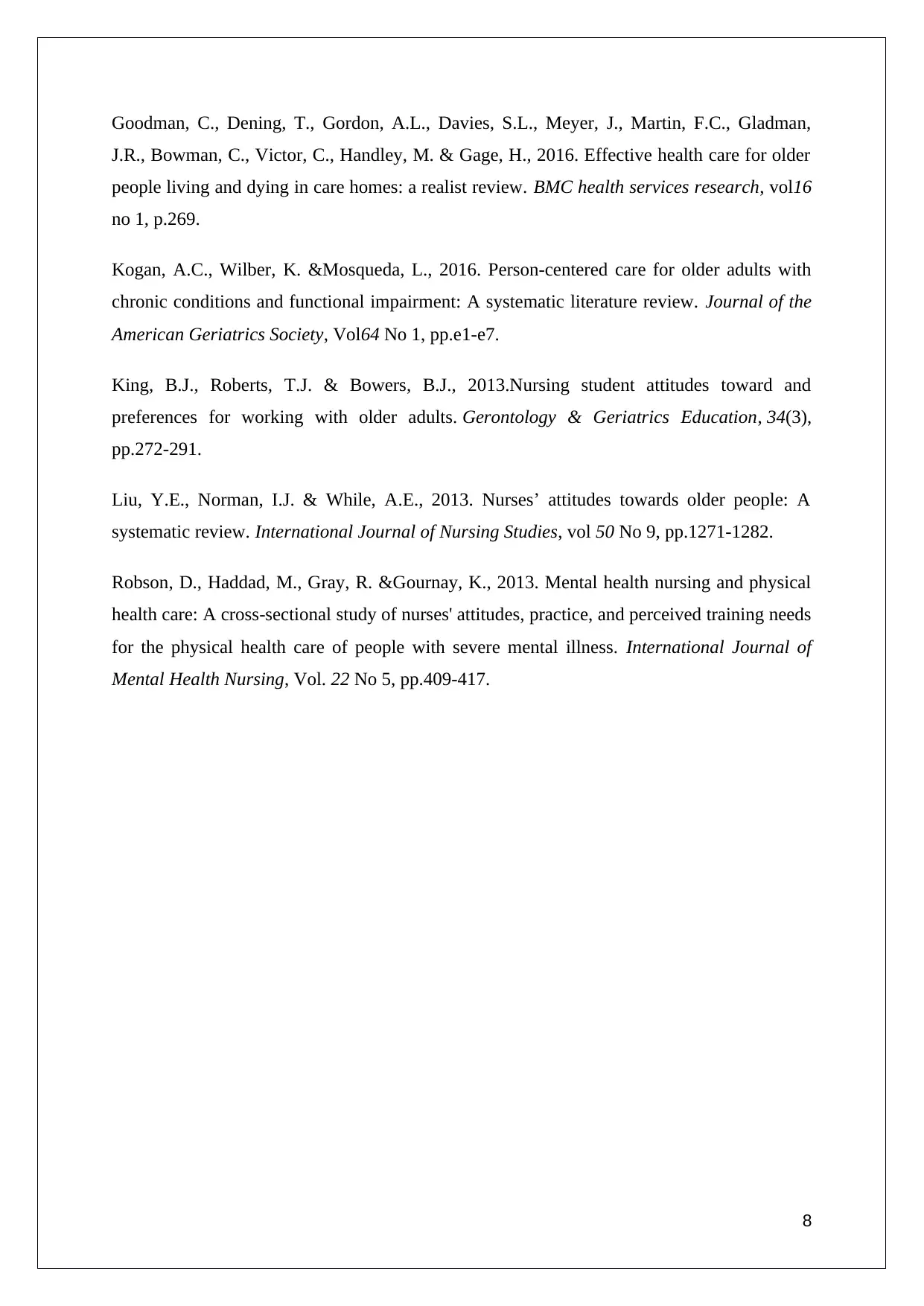
Goodman, C., Dening, T., Gordon, A.L., Davies, S.L., Meyer, J., Martin, F.C., Gladman,
J.R., Bowman, C., Victor, C., Handley, M. & Gage, H., 2016. Effective health care for older
people living and dying in care homes: a realist review. BMC health services research, vol16
no 1, p.269.
Kogan, A.C., Wilber, K. &Mosqueda, L., 2016. Person‐centered care for older adults with
chronic conditions and functional impairment: A systematic literature review. Journal of the
American Geriatrics Society, Vol64 No 1, pp.e1-e7.
King, B.J., Roberts, T.J. & Bowers, B.J., 2013.Nursing student attitudes toward and
preferences for working with older adults. Gerontology & Geriatrics Education, 34(3),
pp.272-291.
Liu, Y.E., Norman, I.J. & While, A.E., 2013. Nurses’ attitudes towards older people: A
systematic review. International Journal of Nursing Studies, vol 50 No 9, pp.1271-1282.
Robson, D., Haddad, M., Gray, R. &Gournay, K., 2013. Mental health nursing and physical
health care: A cross‐sectional study of nurses' attitudes, practice, and perceived training needs
for the physical health care of people with severe mental illness. International Journal of
Mental Health Nursing, Vol. 22 No 5, pp.409-417.
8
J.R., Bowman, C., Victor, C., Handley, M. & Gage, H., 2016. Effective health care for older
people living and dying in care homes: a realist review. BMC health services research, vol16
no 1, p.269.
Kogan, A.C., Wilber, K. &Mosqueda, L., 2016. Person‐centered care for older adults with
chronic conditions and functional impairment: A systematic literature review. Journal of the
American Geriatrics Society, Vol64 No 1, pp.e1-e7.
King, B.J., Roberts, T.J. & Bowers, B.J., 2013.Nursing student attitudes toward and
preferences for working with older adults. Gerontology & Geriatrics Education, 34(3),
pp.272-291.
Liu, Y.E., Norman, I.J. & While, A.E., 2013. Nurses’ attitudes towards older people: A
systematic review. International Journal of Nursing Studies, vol 50 No 9, pp.1271-1282.
Robson, D., Haddad, M., Gray, R. &Gournay, K., 2013. Mental health nursing and physical
health care: A cross‐sectional study of nurses' attitudes, practice, and perceived training needs
for the physical health care of people with severe mental illness. International Journal of
Mental Health Nursing, Vol. 22 No 5, pp.409-417.
8
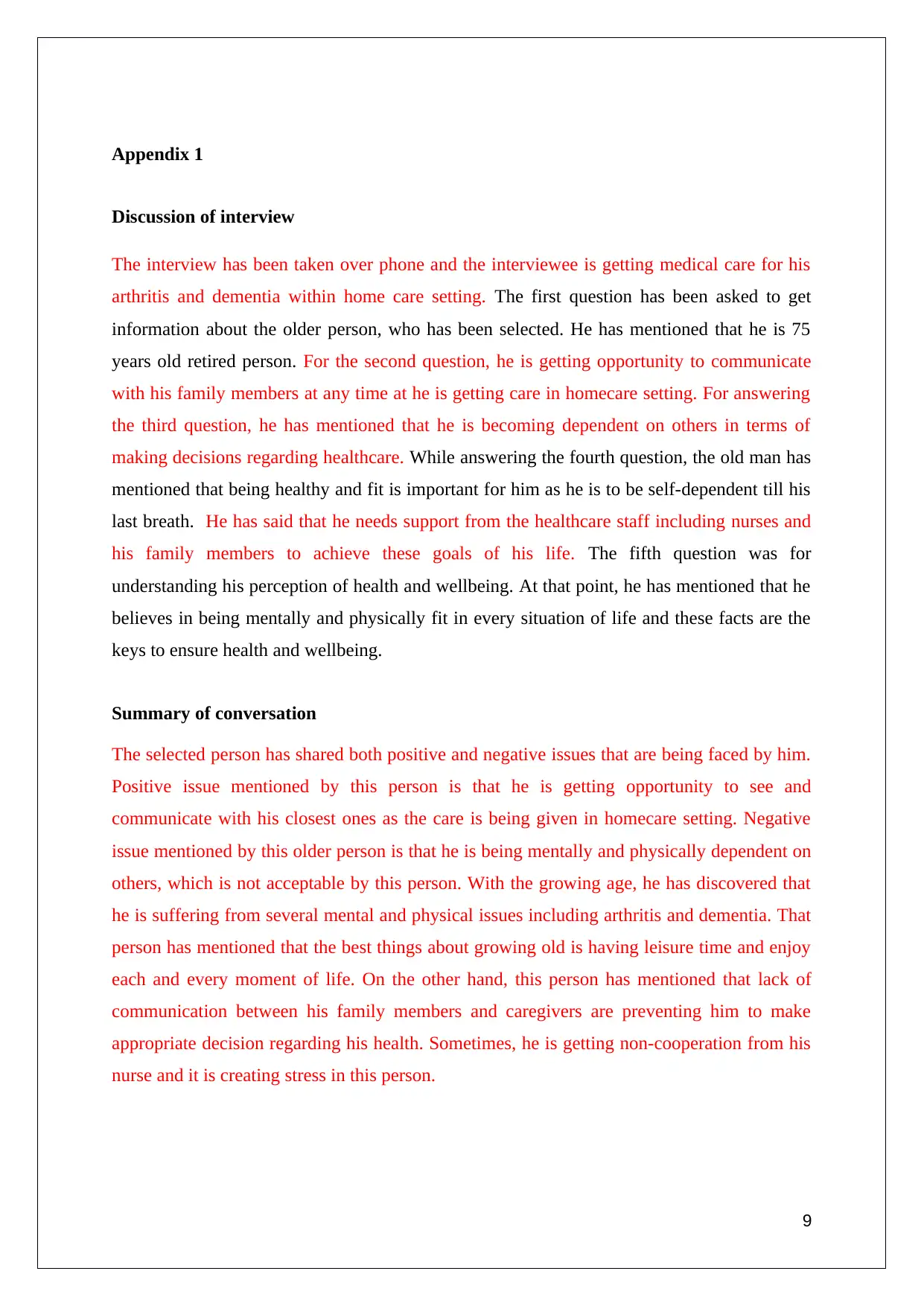
Appendix 1
Discussion of interview
The interview has been taken over phone and the interviewee is getting medical care for his
arthritis and dementia within home care setting. The first question has been asked to get
information about the older person, who has been selected. He has mentioned that he is 75
years old retired person. For the second question, he is getting opportunity to communicate
with his family members at any time at he is getting care in homecare setting. For answering
the third question, he has mentioned that he is becoming dependent on others in terms of
making decisions regarding healthcare. While answering the fourth question, the old man has
mentioned that being healthy and fit is important for him as he is to be self-dependent till his
last breath. He has said that he needs support from the healthcare staff including nurses and
his family members to achieve these goals of his life. The fifth question was for
understanding his perception of health and wellbeing. At that point, he has mentioned that he
believes in being mentally and physically fit in every situation of life and these facts are the
keys to ensure health and wellbeing.
Summary of conversation
The selected person has shared both positive and negative issues that are being faced by him.
Positive issue mentioned by this person is that he is getting opportunity to see and
communicate with his closest ones as the care is being given in homecare setting. Negative
issue mentioned by this older person is that he is being mentally and physically dependent on
others, which is not acceptable by this person. With the growing age, he has discovered that
he is suffering from several mental and physical issues including arthritis and dementia. That
person has mentioned that the best things about growing old is having leisure time and enjoy
each and every moment of life. On the other hand, this person has mentioned that lack of
communication between his family members and caregivers are preventing him to make
appropriate decision regarding his health. Sometimes, he is getting non-cooperation from his
nurse and it is creating stress in this person.
9
Discussion of interview
The interview has been taken over phone and the interviewee is getting medical care for his
arthritis and dementia within home care setting. The first question has been asked to get
information about the older person, who has been selected. He has mentioned that he is 75
years old retired person. For the second question, he is getting opportunity to communicate
with his family members at any time at he is getting care in homecare setting. For answering
the third question, he has mentioned that he is becoming dependent on others in terms of
making decisions regarding healthcare. While answering the fourth question, the old man has
mentioned that being healthy and fit is important for him as he is to be self-dependent till his
last breath. He has said that he needs support from the healthcare staff including nurses and
his family members to achieve these goals of his life. The fifth question was for
understanding his perception of health and wellbeing. At that point, he has mentioned that he
believes in being mentally and physically fit in every situation of life and these facts are the
keys to ensure health and wellbeing.
Summary of conversation
The selected person has shared both positive and negative issues that are being faced by him.
Positive issue mentioned by this person is that he is getting opportunity to see and
communicate with his closest ones as the care is being given in homecare setting. Negative
issue mentioned by this older person is that he is being mentally and physically dependent on
others, which is not acceptable by this person. With the growing age, he has discovered that
he is suffering from several mental and physical issues including arthritis and dementia. That
person has mentioned that the best things about growing old is having leisure time and enjoy
each and every moment of life. On the other hand, this person has mentioned that lack of
communication between his family members and caregivers are preventing him to make
appropriate decision regarding his health. Sometimes, he is getting non-cooperation from his
nurse and it is creating stress in this person.
9
⊘ This is a preview!⊘
Do you want full access?
Subscribe today to unlock all pages.

Trusted by 1+ million students worldwide
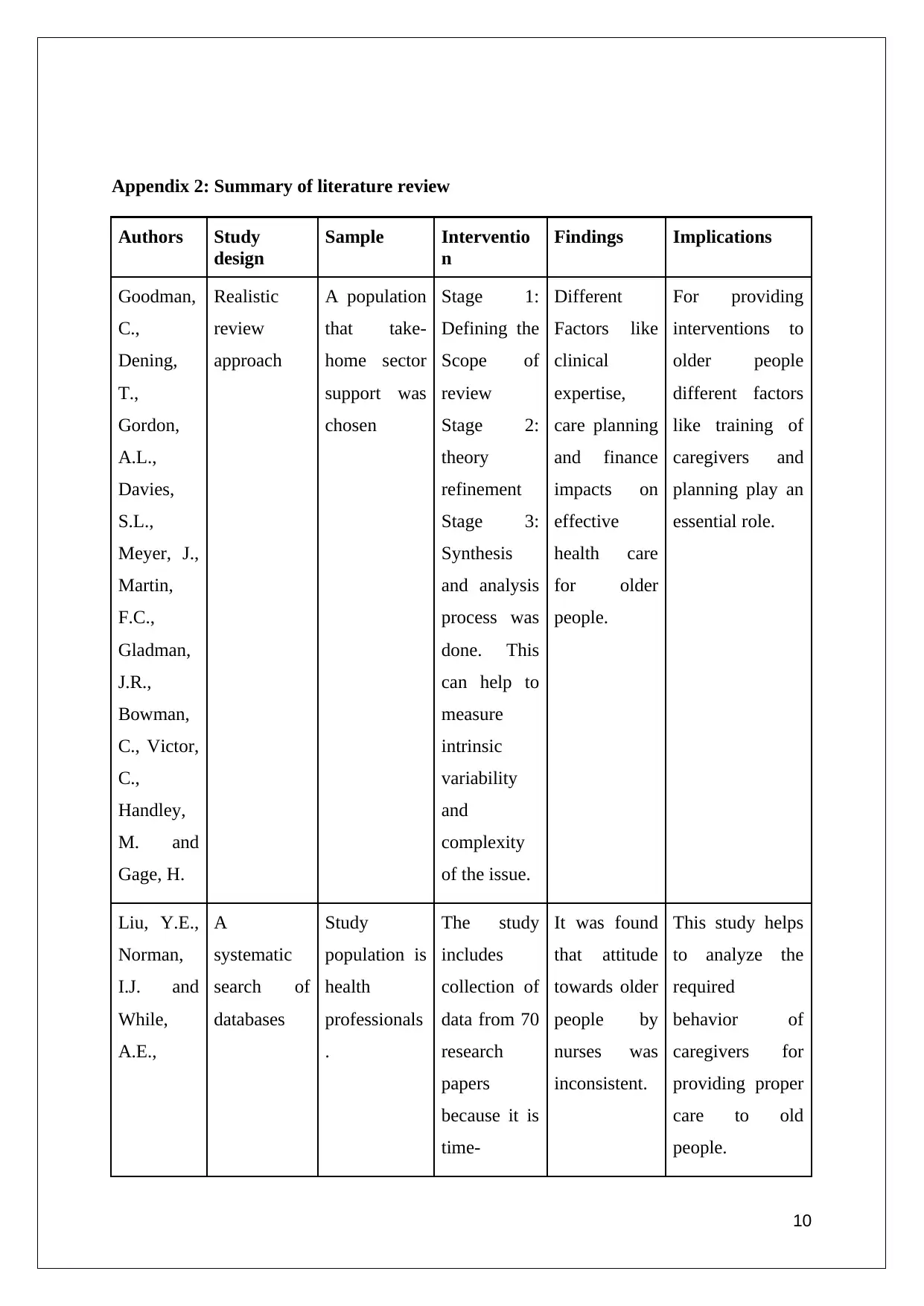
Appendix 2: Summary of literature review
Authors Study
design
Sample Interventio
n
Findings Implications
Goodman,
C.,
Dening,
T.,
Gordon,
A.L.,
Davies,
S.L.,
Meyer, J.,
Martin,
F.C.,
Gladman,
J.R.,
Bowman,
C., Victor,
C.,
Handley,
M. and
Gage, H.
Realistic
review
approach
A population
that take-
home sector
support was
chosen
Stage 1:
Defining the
Scope of
review
Stage 2:
theory
refinement
Stage 3:
Synthesis
and analysis
process was
done. This
can help to
measure
intrinsic
variability
and
complexity
of the issue.
Different
Factors like
clinical
expertise,
care planning
and finance
impacts on
effective
health care
for older
people.
For providing
interventions to
older people
different factors
like training of
caregivers and
planning play an
essential role.
Liu, Y.E.,
Norman,
I.J. and
While,
A.E.,
A
systematic
search of
databases
Study
population is
health
professionals
.
The study
includes
collection of
data from 70
research
papers
because it is
time-
It was found
that attitude
towards older
people by
nurses was
inconsistent.
This study helps
to analyze the
required
behavior of
caregivers for
providing proper
care to old
people.
10
Authors Study
design
Sample Interventio
n
Findings Implications
Goodman,
C.,
Dening,
T.,
Gordon,
A.L.,
Davies,
S.L.,
Meyer, J.,
Martin,
F.C.,
Gladman,
J.R.,
Bowman,
C., Victor,
C.,
Handley,
M. and
Gage, H.
Realistic
review
approach
A population
that take-
home sector
support was
chosen
Stage 1:
Defining the
Scope of
review
Stage 2:
theory
refinement
Stage 3:
Synthesis
and analysis
process was
done. This
can help to
measure
intrinsic
variability
and
complexity
of the issue.
Different
Factors like
clinical
expertise,
care planning
and finance
impacts on
effective
health care
for older
people.
For providing
interventions to
older people
different factors
like training of
caregivers and
planning play an
essential role.
Liu, Y.E.,
Norman,
I.J. and
While,
A.E.,
A
systematic
search of
databases
Study
population is
health
professionals
.
The study
includes
collection of
data from 70
research
papers
because it is
time-
It was found
that attitude
towards older
people by
nurses was
inconsistent.
This study helps
to analyze the
required
behavior of
caregivers for
providing proper
care to old
people.
10
Paraphrase This Document
Need a fresh take? Get an instant paraphrase of this document with our AI Paraphraser
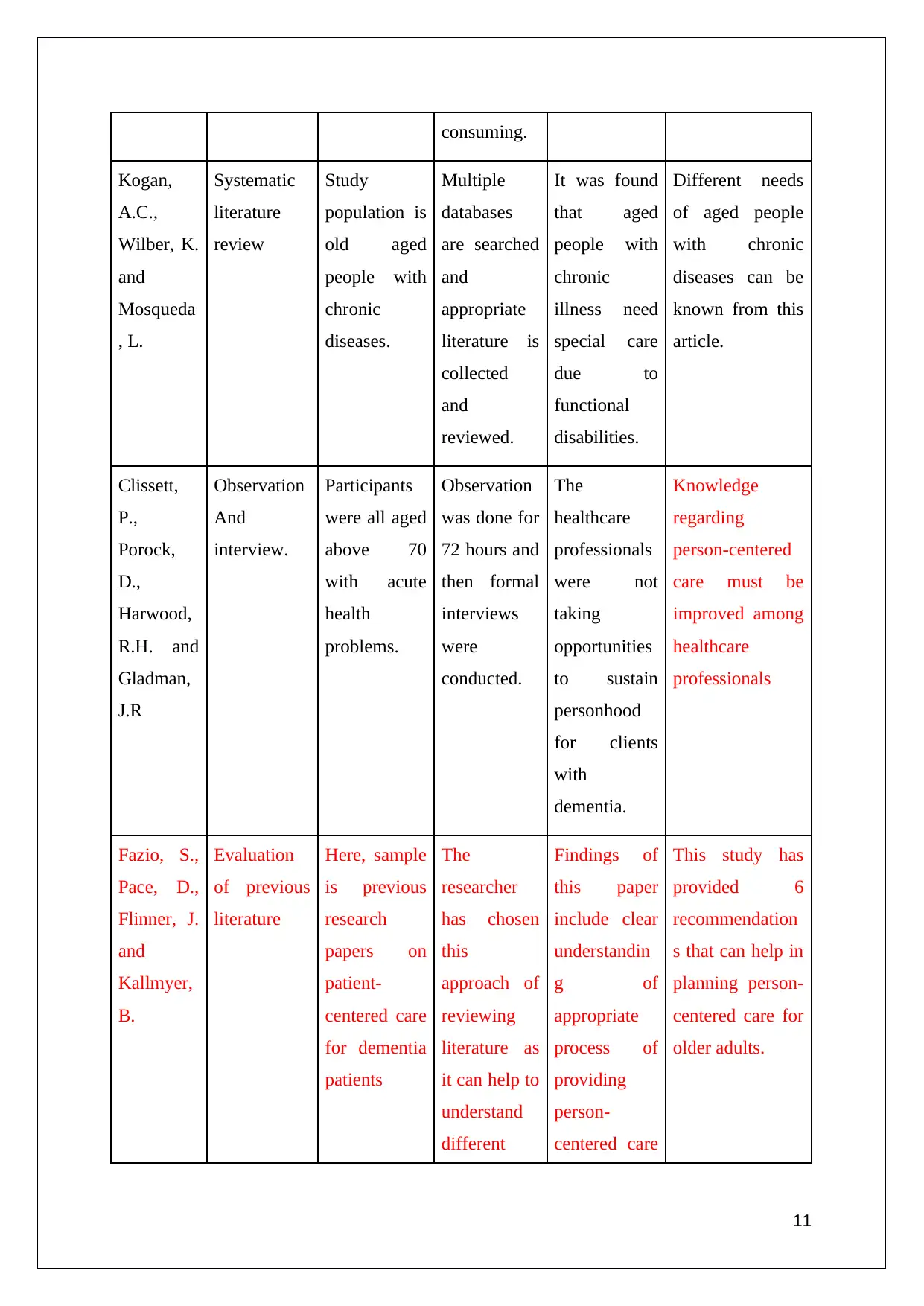
consuming.
Kogan,
A.C.,
Wilber, K.
and
Mosqueda
, L.
Systematic
literature
review
Study
population is
old aged
people with
chronic
diseases.
Multiple
databases
are searched
and
appropriate
literature is
collected
and
reviewed.
It was found
that aged
people with
chronic
illness need
special care
due to
functional
disabilities.
Different needs
of aged people
with chronic
diseases can be
known from this
article.
Clissett,
P.,
Porock,
D.,
Harwood,
R.H. and
Gladman,
J.R
Observation
And
interview.
Participants
were all aged
above 70
with acute
health
problems.
Observation
was done for
72 hours and
then formal
interviews
were
conducted.
The
healthcare
professionals
were not
taking
opportunities
to sustain
personhood
for clients
with
dementia.
Knowledge
regarding
person-centered
care must be
improved among
healthcare
professionals
Fazio, S.,
Pace, D.,
Flinner, J.
and
Kallmyer,
B.
Evaluation
of previous
literature
Here, sample
is previous
research
papers on
patient-
centered care
for dementia
patients
The
researcher
has chosen
this
approach of
reviewing
literature as
it can help to
understand
different
Findings of
this paper
include clear
understandin
g of
appropriate
process of
providing
person-
centered care
This study has
provided 6
recommendation
s that can help in
planning person-
centered care for
older adults.
11
Kogan,
A.C.,
Wilber, K.
and
Mosqueda
, L.
Systematic
literature
review
Study
population is
old aged
people with
chronic
diseases.
Multiple
databases
are searched
and
appropriate
literature is
collected
and
reviewed.
It was found
that aged
people with
chronic
illness need
special care
due to
functional
disabilities.
Different needs
of aged people
with chronic
diseases can be
known from this
article.
Clissett,
P.,
Porock,
D.,
Harwood,
R.H. and
Gladman,
J.R
Observation
And
interview.
Participants
were all aged
above 70
with acute
health
problems.
Observation
was done for
72 hours and
then formal
interviews
were
conducted.
The
healthcare
professionals
were not
taking
opportunities
to sustain
personhood
for clients
with
dementia.
Knowledge
regarding
person-centered
care must be
improved among
healthcare
professionals
Fazio, S.,
Pace, D.,
Flinner, J.
and
Kallmyer,
B.
Evaluation
of previous
literature
Here, sample
is previous
research
papers on
patient-
centered care
for dementia
patients
The
researcher
has chosen
this
approach of
reviewing
literature as
it can help to
understand
different
Findings of
this paper
include clear
understandin
g of
appropriate
process of
providing
person-
centered care
This study has
provided 6
recommendation
s that can help in
planning person-
centered care for
older adults.
11
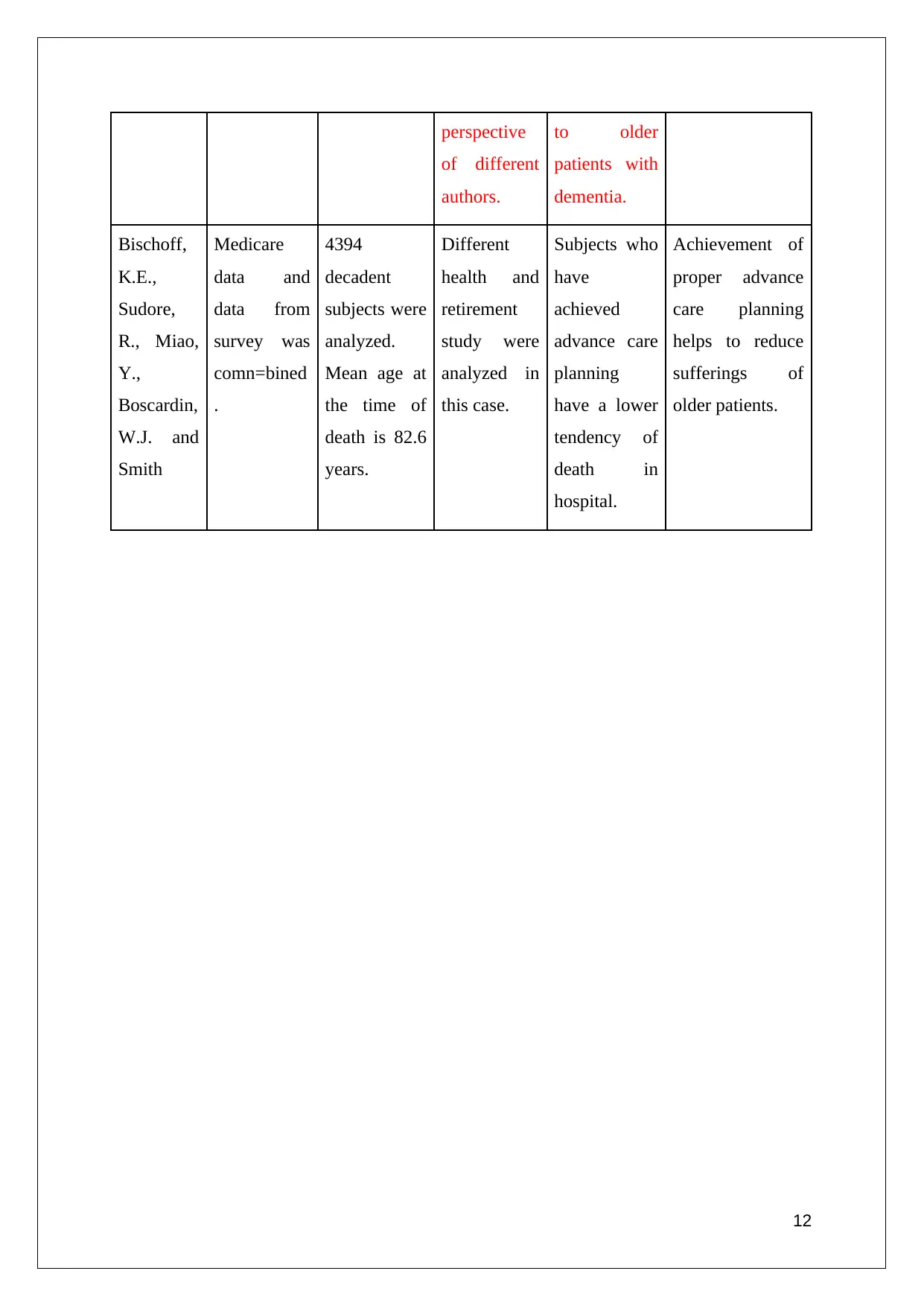
perspective
of different
authors.
to older
patients with
dementia.
Bischoff,
K.E.,
Sudore,
R., Miao,
Y.,
Boscardin,
W.J. and
Smith
Medicare
data and
data from
survey was
comn=bined
.
4394
decadent
subjects were
analyzed.
Mean age at
the time of
death is 82.6
years.
Different
health and
retirement
study were
analyzed in
this case.
Subjects who
have
achieved
advance care
planning
have a lower
tendency of
death in
hospital.
Achievement of
proper advance
care planning
helps to reduce
sufferings of
older patients.
12
of different
authors.
to older
patients with
dementia.
Bischoff,
K.E.,
Sudore,
R., Miao,
Y.,
Boscardin,
W.J. and
Smith
Medicare
data and
data from
survey was
comn=bined
.
4394
decadent
subjects were
analyzed.
Mean age at
the time of
death is 82.6
years.
Different
health and
retirement
study were
analyzed in
this case.
Subjects who
have
achieved
advance care
planning
have a lower
tendency of
death in
hospital.
Achievement of
proper advance
care planning
helps to reduce
sufferings of
older patients.
12
⊘ This is a preview!⊘
Do you want full access?
Subscribe today to unlock all pages.

Trusted by 1+ million students worldwide
1 out of 12
Related Documents
Your All-in-One AI-Powered Toolkit for Academic Success.
+13062052269
info@desklib.com
Available 24*7 on WhatsApp / Email
![[object Object]](/_next/static/media/star-bottom.7253800d.svg)
Unlock your academic potential
Copyright © 2020–2025 A2Z Services. All Rights Reserved. Developed and managed by ZUCOL.





